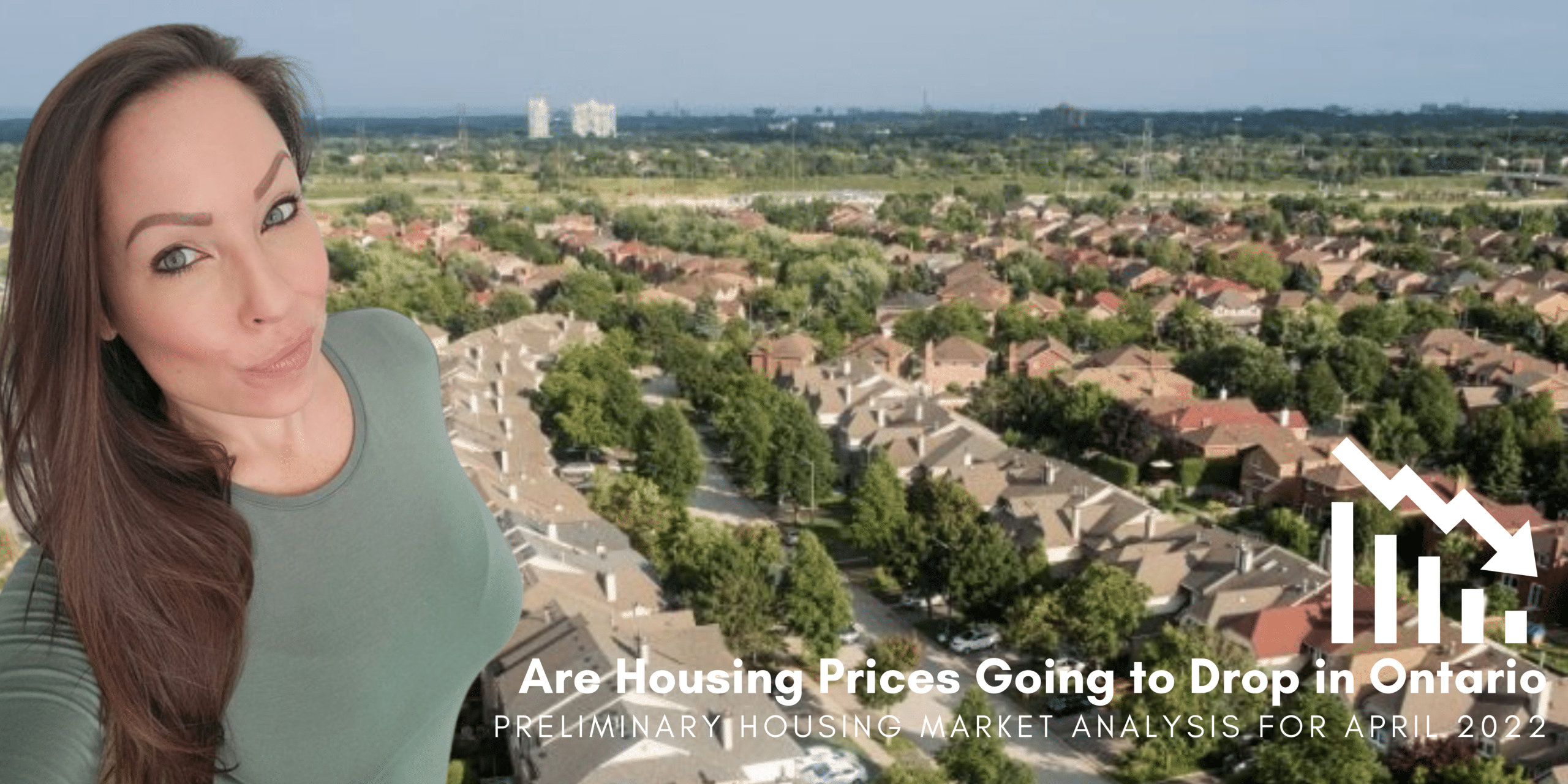
The tide is officially turning in the real estate market. After two years of record breaking sales, both how quickly homes are selling for and at what price point are starting to slow down. I’m sure that home buyers and sellers alike have been wondering, “are housing prices going to drop in Ontario?”
Not only is the answer yes, but the shift is already well on it’s way and I believe things will continue to change since yes another mortgage rate increase is expected to be announced on Jun. 1.
With considerably more supply on the market, this gives buyers the opportunity to take their time to make decisions. It also means that sellers, who have been seeing homes flying off the market in a week or less, will need to be more patient than usual since homes are sitting longer than they have for the past two years.
Rather than try to write my own blog on this topic, I wanted to share this article written by Penelope Graham and published on storeys.com outlining what is happening in the market and what is driving the sudden change.
Early Data Shows GTA Housing Prices On “Rapid Decline” in April
The official spring numbers for the Greater Toronto Area market won’t be out until next week, but early analysis finds that average housing prices in the region are dropping at a rapid pace.
Initial data compiled by Realosophy President John Pasalis comparing the percentage change in sold prices for low-rise homes in the first three weeks of April to the same time frame in February, finds prices are declining across all GTA municipalities, between 6 – 21%.
It’s concrete proof that the anecdotally softer conditions seen thus far this spring are indeed a reality; agents have reported overall fewer buyers in the market, a dramatic drop in offers, and the resurgence of buyers’ market trends such as bully offers and conditions.
Are housing prices going to drop in Ontario? Here are some of the price changes that have already begun to take effect across the GTA throughout this past month, as reported by John Pasalis.
Oakville -7%,
Markham -8%,
Ajax, Aurora and Brampton -9%,
Mississauga -10%,
Oshawa -13%
Milton -15%
“Prices Don’t Drop This Quickly”
What’s doubly unusual about this trend, says Pasalis, is that not only is a February to April price decline unseasonal, the current drop is much steeper than any seen in recent years. A likely culprit are sellers who bought at the late-winter peak who are now in a rush to sell in order to close on their impending transactions.
“The important thing for people to understand is that usually prices don’t drop this quickly,” he tells STOREYS. “Usually, sellers are pretty stubborn. But the reason why it’s happening is because a lot of sellers who are listing now, are actually people who bought homes and who need to sell; and when you find yourself in the situation where you have to sell, you have this pressure to sell for a little bit less than what you expected because you don’t really have many options, quite frankly.”
According to the data, the smallest price declines are in Toronto and Richmond Hill, at 6% each, followed by Oakville, where they’re down by 7%. The most notable plunges can be found in the outer suburbs, where, Pasalis notes, they saw the most dramatic run up in prices during the pandemic’s urban exodus era.
“Those areas — the outer suburbs — that’s where we saw the most rapid appreciation of home prices,” he says. “When we think about what areas are doing better — downtown Toronto in particular didn’t see home prices go up 40%, whereas the burbs did, and I think that’s weighing on those markets now. It’s a lot harder when you’re in that price point, when you’re paying today’s interest rates, basically.”
Today’s rising interest rate environment certainly is a factor; the most recent half-point increase implemented by the Bank of Canada earlier this month will add roughly $200 to monthly payments on an $800,000 variable-rate mortgage. Another important point, adds Pasalis, is that given the volume of home purchasers was much higher than usual over the past two years, today’s buyer pool has been depleted.
“I think COVID and low interest rates and all of that certainly pulled a lot of demand forward in 2020 and 2021. And when you pull demand forward, you’re bringing people’s home buying decisions forward, after that boom in acceleration happens, you’re going to have slightly fewer buyers after the fact,” he says.
Are housing prices going to drop in Ontario. Yes, all signs point to a slower spring.
That prices are starting to trend downward was captured in the March report from the Toronto Regional Real Estate Board; the average home price came in 2.5% lower than February levels at $1,299,894 — though that’s still up 18.4% from a year-over-year perspective.
Activity has also started to dip in the new construction segment, with the Building Industry and Land Development Association (BILD) and Altus Group reporting March new home sales fell 21% in March on an annual basis.
“Total new home sales remained relatively strong in March,” said Edward Jegg, Research Manager at Altus Analytics, Altus Group. “But signs of slowing are emerging, as higher interest rates alongside record prices start to impact demand.”
Pasalis’ numbers also mirror other recent analysis calling for substantial softening in the market. This week, RBC Senior Economist Robert Hogue wrote that home prices are set to peak this spring, projecting a 2.2% decline in the annual average price by 2023 — a turnaround from the previously forecasted 0.8% increase.
“Low rates stoked demand for years, opening the home-ownership door to many Canadians and greasing the wheels for move-up buyers and investors. But with inflation at a three-decade high, the Bank of Canada is now altering its course — signalling it will hike interest rates significantly in the year ahead. We think this will be a game-changer for the market,” reads his note.
However, there are still those with a bullish view on price growth who may contradict the question, “are housing prices going to drop in Ontario?”. Royal LePage forecasted that, based on strong first quarter performance, Canadian home prices are set to jump 15% this year. This is up noticeably from the 10.5% increase that was predicted for 2022 back in December of last year. The revised number comes after Canada’s aggregate home price saw a 25.1% year-over-year increase during the first quarter of 2022, rising to a staggering $856,900. This is the highest increase on record since Royal LePage began tracking aggregate prices.
However, even this forecast notes that slower times are indeed on the horizon. “Entering 2022, we had anticipated a strong first half, and moderating real estate markets thereafter,” said Royal LePage President and CEO Phil Soper.
“Call it buyer fatigue or easing demand, these periods of uncomfortably high home price appreciation do run their course. We are seeing the first signs of moderation in some regions, as more inventory is becoming available and competition eases slightly. The first quarter of the year was so strong, however, that we are bumping up our 2022 outlook. And, home prices will continue to climb in the months ahead as a result of our relentless low supply-high demand imbalance.”
If you’re thinking about buying, selling or investing, let’s chat! I can be reached at 647.896.6584 or by email at info@serenaholmesrealtor.com. To learn more about me and how I operate, click here. For plenty of great tips, news and updates, make sure we’re connected on social and you’ve subscribed to my YouTube channel.
On the hunt for a new home, search listings here.










